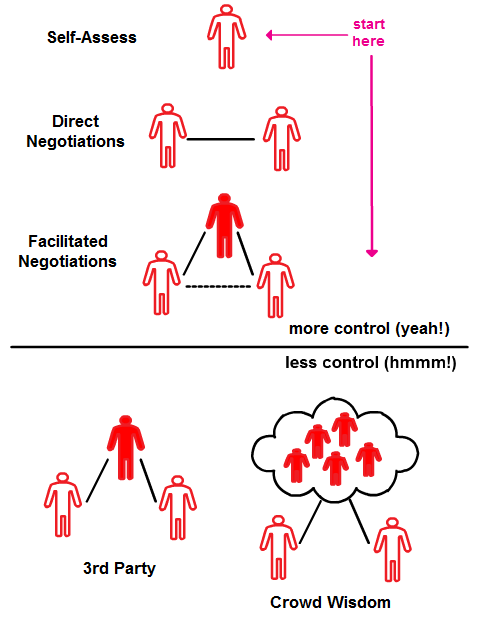What would a values-based Appropriate Dispute Resolution (ADR) framework look like, in an organization?
Recently I listened in on a conversation between 3 well-known mediators/bloggers, Amanda Bucklow, Tammy Lenski,and Diane Levin on the topic of values-based fees in the mediation and ADR world. I’ve also being part of some recent conversations in my local Values-Based Business Network, an association developing and promoting a sustainable business culture.
All this got me thinking about the values I encourage in organizations, related to dispute resolution.
ADR vs. ADR
ADR stands for Appropriate Dispute Resolution. It is also used as an acronym for Alternative Dispute Resolution. The “alternative” part refers to alternatives to the court (e.g., litigation and adjudication by a government-appointed judge) as a way to resolve disputes. In some ways I prefer the “alternative” definition – because it focuses on out-of-court options. In other ways, I prefer the “appropriate” because alternatives are tomorrow’s status quo, and referring to them as “alternative” only delays the inevitable.
ADR Framework
Here’s the basic ADR framework I have in mind for an organization:
Basic ADR options would include:
- Self-assess; a party assesses and remediates their dispute, themselves
- Direct negotiations; parties communicate directly with each, towards resolving their dispute
- Facilitated negotiation; a neutral 3rd party (e.g., mediator) assists conflicted parties to confer with the goal of resolving differences between them, in a manner that leaves the outcome in the hands of the parties.
- 3rd Party rules; a neutral 3rd party (e.g., arbitrator) listens to conflicted parties and makes a decision regarding issues of dispute between them
- Crowd wisdom; a jury (e.g., eBay Community Court), consisting of qualified members of the business community in which the dispute relates, listens to conflicted parties and make a decision regarding issues of dispute between them
Generally; self-assess, direct negotiations, and facilitated negotiations options offer more (for the parties) control over the process, are less formal, more interest-based, lower cost, more confidential, voluntary, and allow for decisions to be made by the parties themselves.
The framework would be established, and run, either face-to-face and/or online.
The Values
Here’s my starting line for values, and that would drive how the ADR framework is deployed:
- Resolve the dispute using the appropriate dispute resolution method
- Work to resolving disputes without the assistance of a 3rd party
- Work to minimize 3rd party intervention in the dispute (if 3rd party is required)
- Look to assign learning agents for the parties in dispute; agents who assist disputants with self-assessment (thinking of my previous post)
- Seek to involve disputants in the ADR process as much as possible, including the process design
- Strive to include an educational component in all disputes; teach disputants how to fish; i.e., learn about ADR, and apply it to their world(s)
- Do no harm; disputants should be no worse off for having participated in the ADR process
- Undertake all ADR-related activities in a spirit of collaboration and innovation (structure + creativity).
And I hope that the Chief Mediation Officer will approve of all this!
Weigh in
Your turn… What do you think of this framework and values? Where does your compass point on values-based ADR?
If you enjoyed this post, please consider leaving a comment or subscribing to my blog. Thanks, Ben.


I think you are good writer, keep us posting
I appraciate your framework,it had assisted me to create a conceptual Framework for my Research,
well done
Hassan… Great. Glad to hear you can use the ADR framework. Is your conceptual framework related to ADR? If so, maybe you want to share what you’re doing?